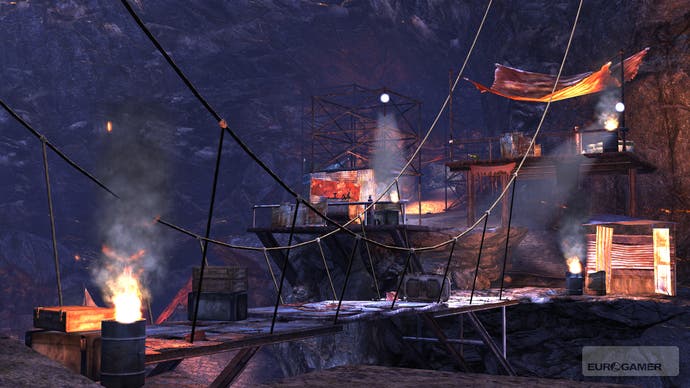Borderlands
Brothers in 650,000 Arms.
In light of every developer ever's recent decision to set their game in the aftermath of a fictional apocalypse, it's easy to assume Borderlands is much the same. It's got barren, desolate plains, the locals are dressed up in rags and desert goggles, and all the jibber-jabber's about settlements and bandits.
As you will know if you were paying attention during the Borderlands reveal at last year's Games Convention, however, that's not the case. This is actually a distant planet called Pandora, where failed colonisation has left disparate groups of maladjusted individuals to fight over the scraps on barren, desolate plains in rags and desert goggles while talking about settlements and bandits. Completely different, see?
If you can get past the theme though, you may be richly rewarded, because Borderlands is an interesting-looking cross between first-person shooter and role-player. You take on one of three roles (two of which we see during our demo), each with unique skills, abilities and backgrounds, and developer Gearbox Software is pushing the RPG angle heavily.
For starters there's an experience-points bar at the bottom of the screen, and as you level up you get to make decisions about how to develop your abilities (using a software interface to hack into your existing hardware augmentations), and improve your proficiency with specific weapons based on their use. Shotgun-lovers may learn to absorb recoil and get better results at range, for instance.
Your character is also persistent across different game sessions, which brings us to the co-operative angle. Gearbox demos the game in co-op and says it's meant to be played that way, and in order to promote and encourage that you will be able to take your character - whatever his current level, equipment and abilities - into another player's game, however much progress he or she has made. Any progress you make there and any items you collect can then be transported back to your single-player game, or indeed taken to another friend's co-op game.

But hang on, you might say, if you're just replaying old bits with a friend, won't you already have all the stuff the two of you discover? And won't you feel a bit bad nicking his loot? Not a bit of it, says Gearbox, for a number of reasons. The big one is that in-game weapons are procedurally generated, which means that Gearbox has laid down a range of parameters (loading mechanism, stock, barrel, etc.) and the game itself creates the guns. The system can produce over 650,000 variations.
So not only will the guns you find probably be new, but you'll covet them. Wooden handles are rare, electrified ammo has a BioShock-style stunning impact, sniper rifles with revolver mechanisms are plain old sexy. When you move towards a dropped gun, a pop-up box allows you to quickly survey its stats and see whether it's better than the one you've got in any crucial area.







